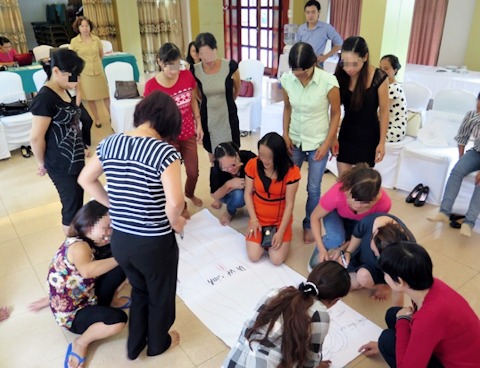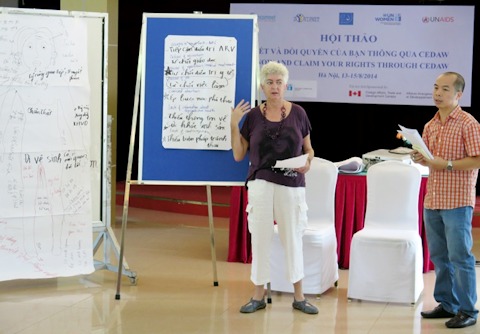Enhancing Vietnamese women living with HIV capacity to know and claim their rights through CEDAW reporting framework
Date:
Leaders from a number of different groups of women living with HIV gathered in Ha Noi last week to participate in a training workshop “Know and claim your rights through CEDAW reporting framework” and highlight the challenges women living with HIV face in fully exercising their rights.
Twenty five leaders from 25 different groups of women attended the workshop organized by Gender and Community Development Network (GenComNet), UN Women in collaboration with UNAIDS and funded by the Department of Foreign Affairs, Trade and Development of Canada and the Japan National Committee for UN Women.
The participants traveled from provinces throughout the country to discuss the rights of people living with HIV and share their own experiences in schools, hospitals, workplaces and other aspects of life where they have encountered discriminatory treatment and how they have responded.

Women living with HIV learn to know and claim their rights through CEDAW
reporting framework. Photo credit: UN Women/Leika Aruga
In Viet Nam, the key affected population that receives the greatest attention in terms of care treatment, prevention, response and evidence generation are drug users, men who have sex with men and sex workers. However, there has been a rise in reported cases of HIV-positive women, who represent 31% of newly reported cases[1], reflecting a slow but steady transmission of HIV to women by men engaging in highly risky behaviours. Intimate partner transmission is a major source of HIV infections among women in the country. More than half of women who tested positive at HIV testing and counselling sites between 2006 and 2010 reported their only possible exposure to HIV was through a husband/long-term partner. Despite this trend, women who are not among the key affected population struggle to receive Government support.
“Women widowed by AIDS or living with HIV may face property disputes with in-laws, complicated by limited access to justice to uphold their rights. Regardless of whether they themselves are living with HIV, women generally assume a disproportionate burden of care for others who are sick from or dying of AIDS, along with the orphans left behind. This, in turn, can reduce prospects for education and employment. Acknowledging these facts, the training aimed to help women living with HIV to analyze their situations from gendered and rights-based perspectives as well as enable them to challenge discrimination against them and their children with strategic advocacy plans,” said Canadian Ambassador to Viet Nam, David Devine, when discussing Canada’s support for this initiative.
During the three-day training, participants identified violations of women’s rights and learned about the Convention on the Elimination of All Forms of Discrimination against Women (CEDAW) and opportunities for civil society participation in the CEDAW reporting process. This provided a base to develop specific advocacy plans to influence changes to improve their lives.

Susan Paxton, the workshop trainer, helped women living with HIV develop specific advocacy plans. Photo credit: UN Women/ Leika Aruga
“After the training, we feel stronger, have a better understand of each other and are more confident. We found it very important to claim our rights as women living with HIV in the CEDAW shadow report. We never thought we could have the opportunity to participate in this important process,” said Quach Thi Mai, chairwoman of a nationwide network of women living with HIV.
“The participatory training approaches helped us quickly absorb training content. We were equipped with necessary soft skills in advocacy through an interesting role-play exercise,” Mai added.
Following the training, networks of women living with HIV will submit a report together with a broader network of women advocates to express their chief concerns to the CEDAW Committee next year. This report, which is called CEDAW shadow report, will help the Committee understand how CEDAW is implemented on the ground, especially as Viet Nam is being reviewed at the Committee’s 61st session in July, 2015. UN Women and UNAIDS will continue supporting the network’s initiative to reflect the voices of women living with HIV into the report, along with input from other groups of women in Viet Nam.

[1] HIV/AIDS Case Report and Implementation of HIV/AIDS Prevention and Control Program in 2011.Planning for 2012. Ministry of Health, February 2012